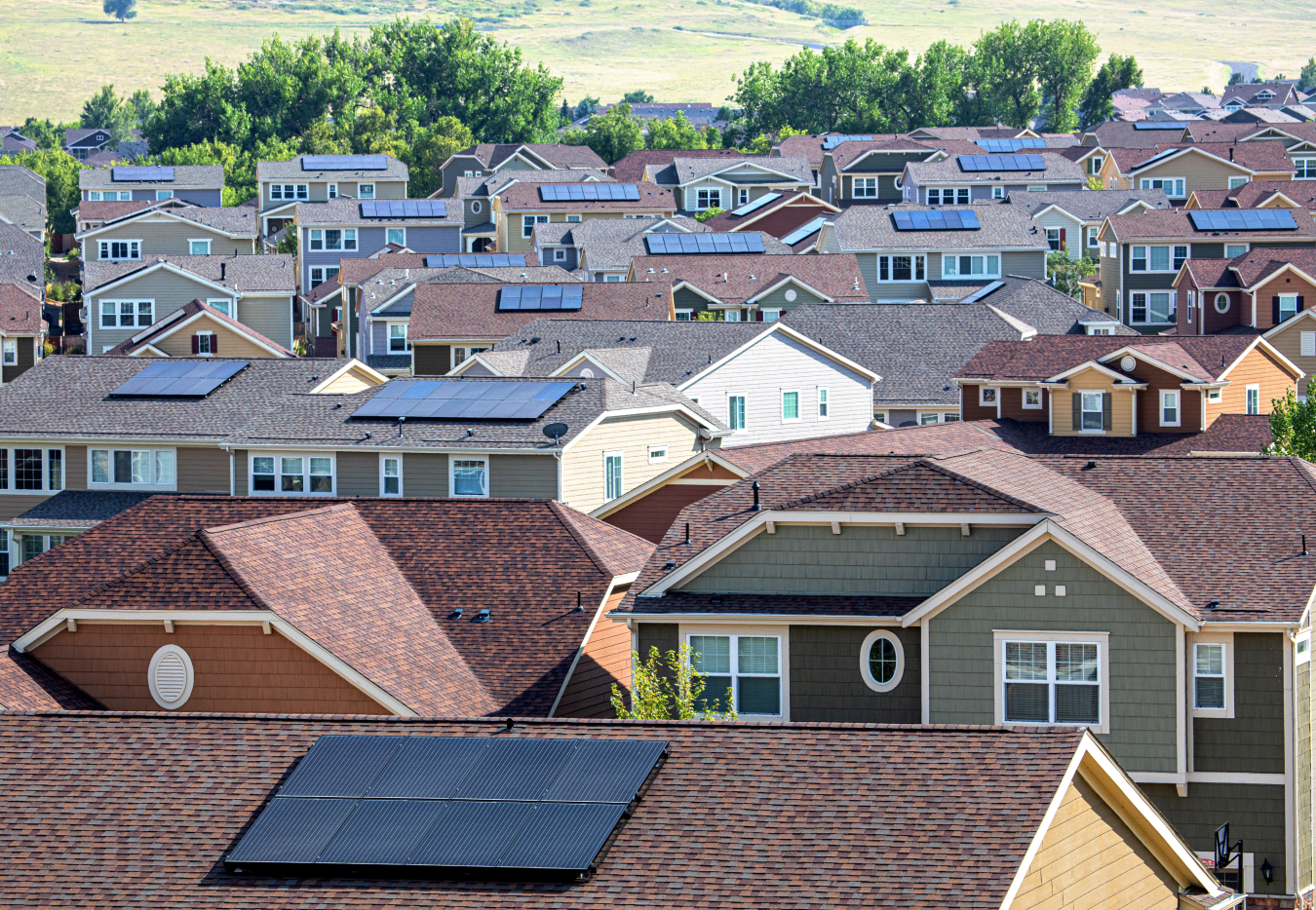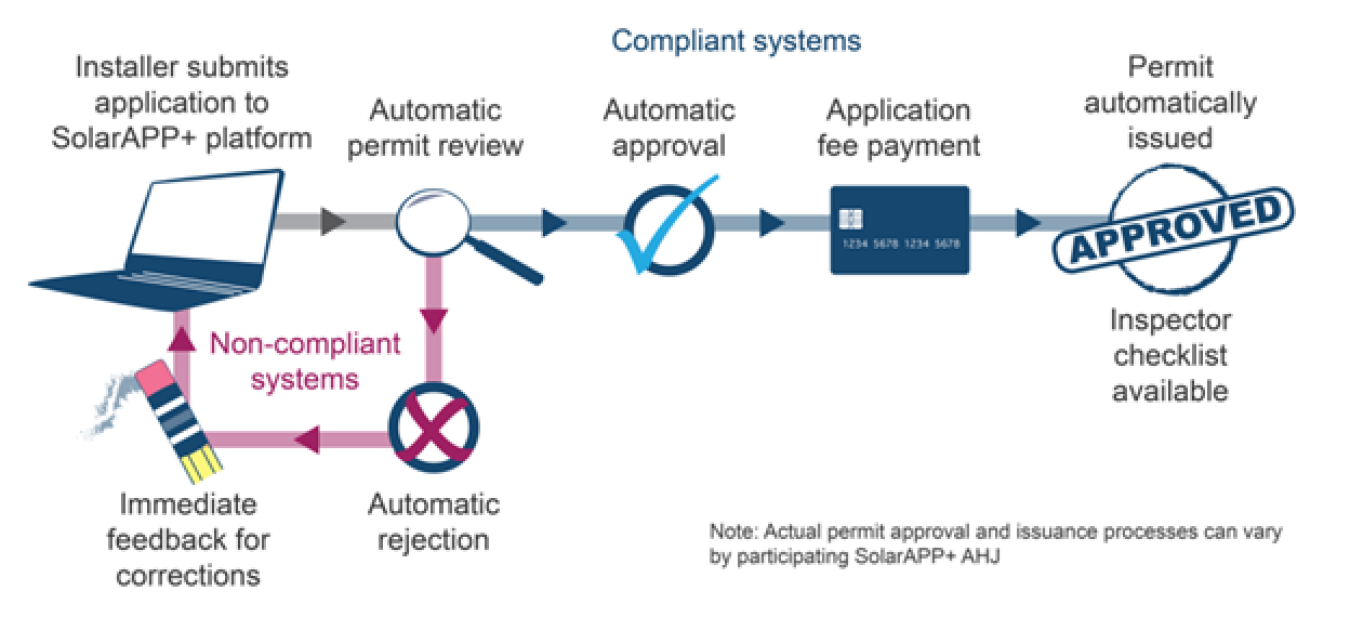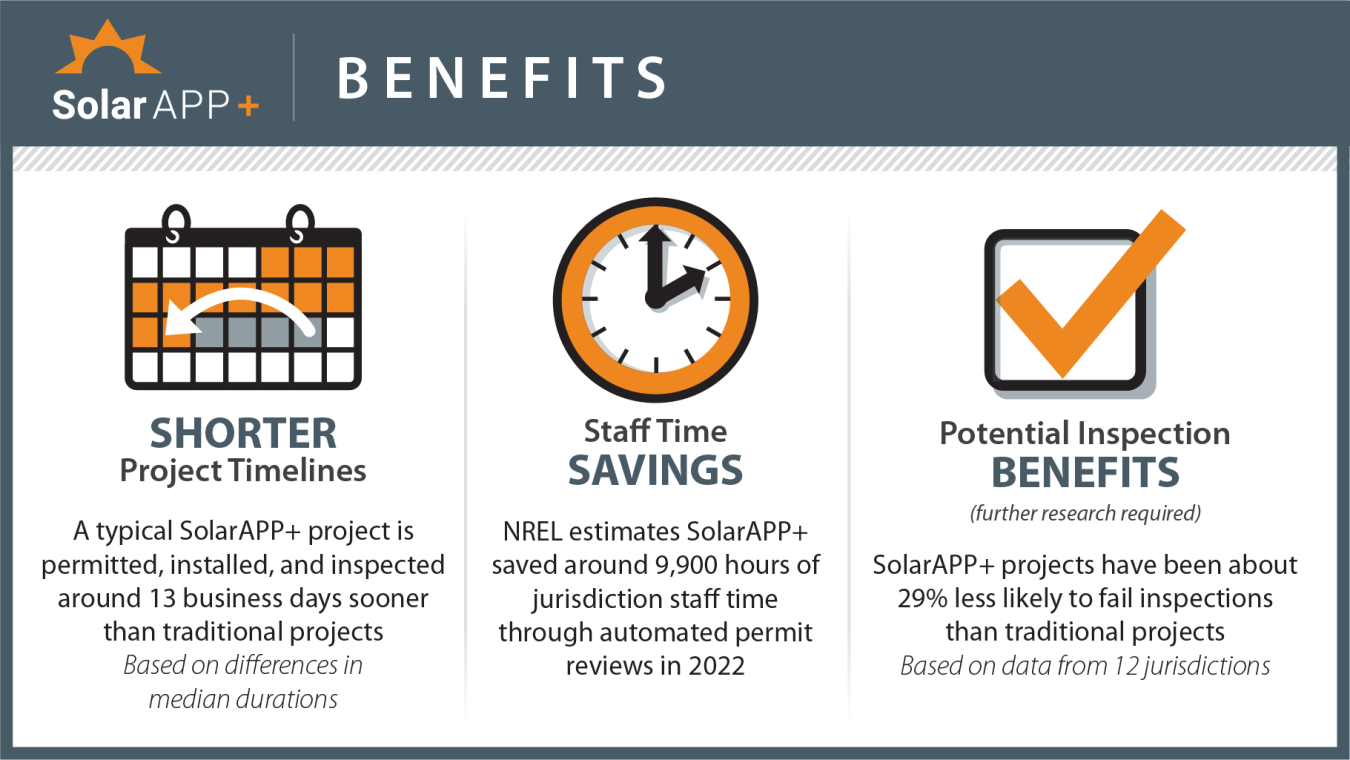Created by a team of researchers out of the National Renewable Energy Laboratory (NREL), SolarAPP+ is an online platform that instantly issues permits for code-compliant residential photovoltaic systems,.
Office of Technology Transitions
July 31, 2023A Technology Commercialization Fund Success Story
The permitting process is one of the biggest bottlenecks for residential solar installation and the Solar Automated Permit Processing Plus (SolarAPP+) platform is tackling this challenge one permit at a time. Launched in 2021, SolarAPP+ now serves more than 62 communities across the nation, with more than 22,000 permits issued, 127,000 kilowatts approved, and 22,000 estimated hours saved in review time. Created by a team of researchers out of the National Renewable Energy Laboratory (NREL), SolarAPP+ is an online platform that instantly issues permits for code-compliant residential photovoltaic systems, making it easier for local governments to approve standardized projects quickly and safely. As a result, SolarAPP+ projects are permitted, installed, and inspected 13 days sooner than traditional projects and staff are saving between 15-60 minutes of review time per permit.
The team initially received funding from the U.S. Department of Energy Solar Energy Technologies Office (SETO) as part of the Technology Commercialization Fund (TCF) in 2019, administered by the Office of Technology Transitions. From the onset, SolarAPP+ engaged industry partners, such as the California Solar Storage Association, Solar Energy Industries Association, Sunpower, Sunrun, and Tesla. A SolarAPP+ Foundation has been established to transition SolarAPP+ from the NREL team into a sustainable long-term operation. In the meantime, SETO has continued to support SolarAPP+’s development and technical assistance for adopters. The NREL team has expanded into storage permitting and is exploring several other clean energy technologies to incorporate into the SolarAPP+ software.
The Origin of SolarAPP+
Jeff Cook, the SolarAPP+ Program Lead at NREL, says his team began exploring ideas to automate permitting back in 2017: “There were a few communities that figured out how to do this efficiently. And we said, hey, maybe it’s time to have a truly scalable process for this nationwide.”
His team identified problems that made an automated solution attractive for rooftop solar permitting: “Solar technology has been rapidly evolving since the early 2000’s and how you enforce the building codes changes with every evolution of the technology. So, local governments struggle to know how to review the newest solar equipment. On top of that, they’re getting thousands more applications than they ever were before with the same small number of people on staff who review applications.”
His team continued to engage stakeholders in conversation as they explored how to move forward, “We understood that NREL and the Department of Energy partnering together was not going to be sufficient. We needed jurisdictions, code officials, and the installer communities to be involved from the outset of this project. We had a huge coalition talking about this and growing together by the time this TCF opportunity came around…and we jumped on it because we saw this as the way to move from concept to reality.

Participating in the Technology Commercialization Fund
“We had a concept, and we had a software foundation that we could build upon, but it was really early. To be honest, we weren’t sure it was going to work,” Jeff reflects on the stage of the project as they applied for TCF Funding. Over the next two years, the team built out an online platform that automates review of residential rooftop solar systems and can provide instant approval for code-compliant systems. Based on the application inputs, SolarAPP+ also generates checklists for inspectors to confirm that installed systems match preapproved designs. By the end of their TCF period, the team was piloting with five jurisdictions and formally launched the tool in July 2021.

Jeff describes the progress they were able to achieve: “We used these funds as the catalyst to jump from the concept idea to reality. It was truly one of those cases where without this investment we would never be here today, and we probably wouldn’t even be here five to 10 years from now. The solar office (SETO) understood the success that we had under OTT’s TCF program. It looked good enough for them to invest a significant funding amount to get us over the edge and begin scaling to where we are today.”
Milestones Achieved Since Launch
SolarAPP+ is live across the nation and has helped issue over 22,000 permits across 62 communities. The platform helps permit review staff save up to an hour of review time on each permit and supports inspectors with a checklist aligning with the latest national code and standards for them to use as they’re out in the field. All seven of the project partners on the original TCF funded agreement are still involved to some extent today and SolarAPP+, or a commensurate process, has even been mandated in California as part of the state’s permitting process.

Looking Forward
These days, the team is thinking about the continuity of SolarAPP+ and building a self-sustaining enterprise. SolarAPP+ has 600 jurisdictions in the pipeline waiting to adopt the SolarAPP+ project and there is now a SolarAPP+ Foundation. Larry Sherwood, Chairman of the board for the foundation, discusses the future, “SolarAPP+ has been in a development phase so far and we’re now seeing the implementation by communities around the country really accelerating. I was involved in the early conversations around the structure of how SolarAPP+ would operate on a long-term basis and we came up with this structure, which is creating a non-profit organization so that different stakeholders and the public interests are represented as SolarAPP+ develops.”
As a next step, the team has partnered with a private sector company, UL Solutions, to take over the day-to-day administration of the technology platform. Since the early stages, UL Solutions team has worked side by side with NREL and SolarAPP+ Foundation partners to contribute expertise in safety and compliance. “As the U.S. urgently addresses the transition to clean, renewable energy, expedited permitting on residential solar projects while prioritizing compliance with safety and code standards will be critical,” said Ken Boyce, senior director of principal engineering at UL Solutions, “We applaud our strategic partnership with NREL and the value SolarAPP+ brings to governments, the public, and the solar industry, and how it will serve as an important enabler of safer and cleaner energy.” UL Solutions is now the long-term SolarAPP+ host as the platform evolves and expands availability across communities.
In the meantime, Jeff and his team are busily updating the software platform to incorporate the latest 2023 National Electrical Code to ensure SolarAPP+ remains up to date with the latest codes. The team also began piloting battery storage permitting back in summer 2022 and is expecting to go live with it nationwide by the end of September. Furthermore, they are in the early stages of exploring opportunities around applications like heat pumps or electric vehicle charging equipment. For them, solar was just the beginning.
The Office of Technology Transitions (OTT) oversees the expenditure of the U.S. Department of Energy technology transfer funds through implementing the Technology Commercialization Fund (TCF) across the Base Annual Appropriations TCF and the Bipartisan Infrastructure Law TCF. The Base Annual Appropriations TCF is the base program created by the Energy Policy Act of 2005, which provides an estimated $35 million annually to support the commercialization of National Lab technologies and build out the National Lab commercialization ecosystem. The Bipartisan Infrastructure Law (BIL) provided more than $62 billion to DOE for Research, Development, Demonstration, & Commercial Application. To learn more, visit Technology Commercialization Fund | Department of Energy.
To learn more about SolarAPP+, please visit SolarAPP+ (nrel.gov).

